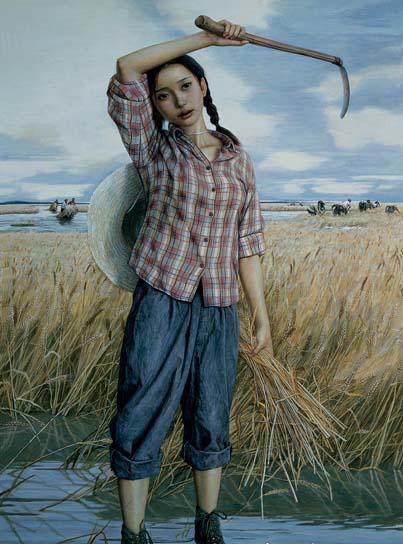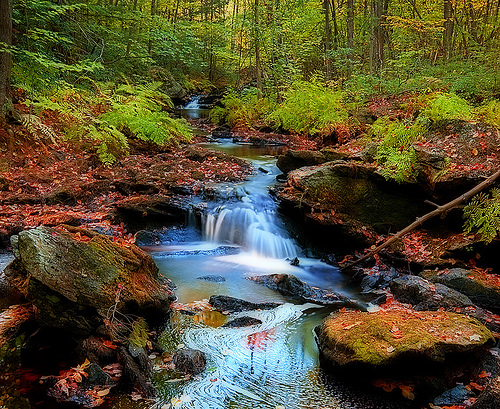Sunrise on the Hills: Summary
The poem consists of three stanzas of varying lengths. The first stanza is made up of eighteen lines. The second stanza is made up of twelve lines. And the third stanza is made up of six. Hence, the entire poem consists of thirty-six lines in total.
1st stanza:
I stood upon the hills when heaven’s wide arch
Was glorious with the sun’s returning march,
And woods were brightened, and soft gales
Went forth to kiss the sun-clad vales.
The clouds were far beneath me; bathed in light,
They gathered midway round the wooded height,
And, in their fading glory, shone
Like hosts in battle overthrown.
As many a pinnacle, with shifting glance.
Through the gray mist thrust up its shattered lance,
And rocking on the cliff was left
The dark pine blasted, bare, and cleft.
The veil of cloud was lifted, and below
Glowed the rich valley, and the river’s flow
Was darkened by the forest’s shade,
Or glistened in the white cascade;
Where upward, in the mellow blush of day,
The noisy bittern wheeled his spiral way.
In this stanza, the poet describes a visit of his to the hills. On this visit, he stood still and looked up at the sky, which seemed to form an arch in his field of vision. This entire arch of the sky was lit up with the sun’s glow as it was getting ready to rise. The woods that covered the hills that Longfellow was visiting and the valleys that stretched out between and beneath them were also lit up. A soft breeze was blowing over the landscape. As he was standing on the summit of a mountain, the poet could see clouds floating below the level he himself was. The sun was shining over the clouds and appeared midway between the summit and the ground level and around the forests that grew all over the hills. The clouds also have their glory in Longfellow’s opinion, as does everything else – great or small – on this earth. However, that glory had paled in comparison to the glory of the rising sun. The poet imagines that the sun and the clouds were locked in battle, as so many armies have been through the ages, and that finally, the sun has won. The clouds have been defeated and are hiding away now. The poet also noticed other things around him as well. He saw how every mountain around him seemed to raise a lance with its pointed tip shattering the sky above it. Every cliff was bare, except for one where a pine tree stood still awaiting the sunlight. This pine tree appeared to have been destroyed, split into half, and bereft of all leaves as if it had been struck by lightning. Suddenly, in the midst of all this, the clouds disappeared. The poet imagines the clouds as a veil covering a woman’s face as soon as the clouds are lifted, the valley beneath shines in the sunlight. Along this valley, a river was flowing. A part of the river fell under the shade cast by trees of the hilly forest, and another part of it shone in the sunlight as a waterfall was created along its length. Far above all this, as the day was lengthening, the poet saw a bittern flying in a spiral and chirping away.
2nd stanza:
I heard the distant waters dash,
I saw the current whirl and flash,
And richly, by the blue lake’s silver beach,
The woods were bending with a silent reach.
Then o’er the vale, with gentle swell,
The music of the village bell
Came sweetly to the echo-giving hills;
And the wild horn, whose voice the woodland fills,
Was ringing to the merry shout,
That faint and far the glen sent out,
Where, answering to the sudden shot, thin smoke,
Through thick-leaved branches, from the dingle broke.
In this stanza, the poet describes his visit to the hills and chooses to focus specifically on the river flowing beneath him. Though the waters were so far away from him, their current was so strong and swift that he could hear the waters hitting the rocks on the shore. The river’s waters had also formed a lake, but here the waters were still, and there was no noise at all. The light and had on the beach next to it formed an optical illusion and fooled the poet into thinking that the beach was, in fact, silver in color. Every single sound was echoed by the hills, and the poet, in particular, could hear the sound of a bell in some distant village echoed back to him with a subsequent increase in volume. The poet could also hear the sound of a horn and people making merry. In tandem with the sudden disturbance caused by the blowing of the horn, a thin line of smoke could also be seen rising through the branches of the trees covering the hills.
3rd stanza:
If thou art worn and hard beset
With sorrows, that thou wouldst forget,
If thou wouldst read a lesson, that will keep
Thy heart from fainting and thy soul from sleep,
Go to the woods and hills! No tears
Dim the sweet look that Nature wears.
In this stanza, the poet tells his readers what he has learned from his visit to the hills. He tells them that if they are ever beset with difficulties and sorrows if they are tired of the path their lives have taken, they should come to the hills. If they wish to forget their troubles, they should come to the hills, for the hills can teach them a lesson on how to stop themselves from losing hope. Even if they are to start crying, they would not be able to ignore the beauty of Nature in such a landscape.
Some online learning platforms provide certifications, while others are designed to simply grow your skills in your personal and professional life. Including Masterclass and Coursera, here are our recommendations for the best online learning platforms you can sign up for today.
The 7 Best Online Learning Platforms of 2022
- Best Overall: Coursera
- Best for Niche Topics: Udemy
- Best for Creative Fields: Skillshare
- Best for Celebrity Lessons: MasterClass
- Best for STEM: EdX
- Best for Career Building: Udacity
- Best for Data Learning: Pluralsight
















